|
Summertime is here and with the change in schedules and weather, people make plans for vacations or simply enjoy a more relaxed routine. Our family vacations over the years were full of outdoor adventures in the mountains or at the beach visiting our extended families. Wherever you choose to vacation – even if it’s a staycation in your hometown – can be a beautiful time full of spiritual refreshment. Years ago, when I was in the trenches with six kids aged 18 to newborn, I read a book called Sanity in the Summertime: The Complete Summer Survival Handbook for Moms by Claudia Arp and Linda Dillow. I adopted many of their great ideas and incorporated some of my own to bring more of the richness of our Catholic heritage into our family life. This time of refreshment is a wonderful time to renew your relationship with the Lord and to help those in your family to cultivate their individual faith life. I have compiled a list of the things that we incorporated into our vacation and summertime routines over the years. This list is just a beginning and the potential for summertime recreation is limitless based on your family’s personalities and interests.
The beauty of vacation time or a more relaxed summer schedule involves soaking up the blessings of the time and intentionally bringing Jesus into the season to enrich your faith life and discover the creative ways God is moving in our lives. He has given us everything. When we can slow down and change the pace and the environment for a little bit, we can see more clearly His love and provision for us. This clearer vision of our communion with God enables us to deepen our relationship with Him and to answer His call. Let this song be our mission in our vacationing: “Day by day, Day by day, O dear Lord Three things I pray: To see Thee more clearly, Love Thee more dearly, Follow Thee more nearly- Day by day” Lyrics by Robin Lamont
0 Comments
Faith is a gift. The ability to practice that faith, to worship freely, to share our faith in the public square, is also a gift. Each year, the Church in the US observes Religious Freedom Week. This year, we focus on Solidarity in Freedom. In Fratelli Tutti, Pope Francis writes, “Solidarity means much more than engaging in sporadic acts of generosity. It means thinking and acting in terms of community” (Fratelli Tutti, 116). The theme of Solidarity in Freedom forces us out into a global mindset, to one of community and fraternity. I’d like to focus on Religious Freedom Week through the stories of two men 400 years apart, Safa Al Alqoshy and St. John Southworth. At the 2018 Synod on Young People, the Faith, and Vocational Discernment, Safa Al Alqoshy, the only youth delegate from Iraq to the Synod, shared the story of the struggle of Iraqi Christians. While I didn’t meet Safa in my time at the 2018 Synod, I was around him during the 2019 Post-Synod Forum in Rome on Christus Vivit. His stories from the Synod followed him back to Rome where he was met with great admiration. Even though he had to arrive at the Forum late, the community that formed with him was immediate. Safa said to Crux, “It’s very important to pay attention that there is not only persecution by killing, there is a persecution by psychology, by feelings. You feel that you are alone, that you are not supported” (Crux). Safa expressed the reality of friends and family fleeing from Iraq, likely not to be seen again. He wasn’t just speaking generally about the people of Iraq, but from his own personal experience. He shared about two of his friends who were killed in a car bombing in 2009 and how Safa and his friends shared the common experience of saying, “see you next week” only to never see one another again. The temptation can be to take Safa’s story, and the story of so many Christians like him across the world, and to use it for our own advantage. To share it as an example, but one devoid of the personal reality which courses through its proverbial veins. When we share Safa’s story as just another example of the terrible persecution that Christians face, even worse as a “look what could happen to us next” story in relation to religious freedom in the US, we fail to show solidarity. We dehumanize those who have died, those who have been separated by the flight for freedom and safety, and we turn our suffering brothers and sisters into objects whose story we use for our perceived gain. No, instead, Pope Francis urges us to be in true solidarity with Safa and his friends and family, to think and act in community. We must pray for them, we must give when we can give, but we cannot use them as pawns in a game of politics that is antithetical to true solidarity. About 400 years before Safa there lived an English priest by the name of John Southworth. John was born around 1592 and was ordained in 1618 at the English College, Douai in France. St. John was arrested and imprisoned multiple times throughout his life, all for being a Catholic priest. Between his imprisonments, St. John would serve the plague victims of Westminster and provide sacraments to the sick and dying. St. John was arrested for the final time in 1654 and was sentenced to be hung, drawn, and quartered. His body was returned to France in 1655 and buried after having been, literally, put back together. During the war between the English and French in 1793, St. John’s body was buried in an unmarked grave where it remained until 1927 when the grave was discovered. He was canonized in 1970 by Pope St. Paul VI. John’s story is one of perseverance and solidarity. He was arrested multiple times and, eventually, killed for his Catholic faith. All throughout that time, he remained in solidarity with the English people, serving them through the sacraments, refusing to allow his own persecution to stand in the way of his Gospel mandate to be Christ to the world around him. Religious Freedom Week invites us to be, like St. John, fervent in our faith. It reminds us that, even in times of persecution, we carry on in sharing the Gospel. The week also invites us to remember those in our days who are persecuted, such as Safa and our brothers and sisters in Iraq. Solidarity means that we are united with them in prayerful community, but never using them for our own means- detaching their story from their persons. May we pray for all persecuted Christians and reflect upon the meaning of religious freedom this week with the hope of growing in solidarity with our brothers and sisters across our Universal Church.
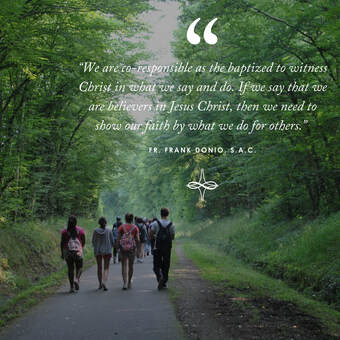 As the pandemic eases in the United States and much begins to reopen, we have the opportunity to reflect on where we have been as Church and what we are called to do. Many are still suffering around the world and in the U.S. from the effects of the pandemic. This moment is a unique one to revive faith and rekindle charity as apostles of Christ. The Dogmatic Constitution on the Church of the Second Vatican Council, Lumen Gentium, reminds us: “The holy people of God shares also in Christ's prophetic office; it spreads abroad a living witness to him, especially by means of a life of faith and charity and by offering to God a sacrifice of praise, the tribute of lips which give praise to his name” (12). We are co-responsible as the baptized to witness Christ in what we say and do. If we say that we are believers in Jesus Christ, then we need to show our faith by what we do for others. Seems easy. It is not, as we know. We cannot go about it alone. We need the grace provided by Christ, particularly in the Sacraments, especially the Eucharist. This is why livestreams of Mass are not enough. We need to receive Christ in the midst of the community of faith, the Church, and then strengthened by him and the community, we can go forth in his name, doing his mission. What an amazing responsibility we have! To live it well, we must be living witnesses of Christ. Pope Francis invites us, in line with the exhortation of many saints, to take it a step further: “Do not be afraid to set your sights higher, to allow yourself to be loved and liberated by God. Do not be afraid to let yourself be guided by the Holy Spirit. Holiness does not make you less human, since it is an encounter between your weakness and the power of God’s grace. For in the words of León Bloy, when all is said and done, ‘the only great tragedy in life, is not to become a saint’” (Gaudete et Exsultate, 34). May the Charity of Christ urge us on!
Over the course of this past year, we have had many opportunities to lose hope. Friends and family became ill, we could not enjoy a common handshake or hug, loved ones died, churches, schools, and recreational activities were shuttered, and we were required to keep distant from each other. In such circumstances, it is easy to feel low, to feel alone, and to feel as though better times are not on the way. Yet, the saints we honor on this day teach us the exact opposite – in the darkest of times, that is when hope is most needed. By clinging to hope, one can get through any hardship. St. Thomas More (1478-1535) is probably one of the most well-known English Catholic saints. The quote, “I die the King’s good servant, and God’s first,” is attributed to him and typically serves as the basis for many a reflection on faithful citizenship. He was also a prominent humanist and counted the great Erasmus as a friend. More famously refused to acknowledge Henry VIII as head of the Church of England, leading to More’s imprisonment and eventual execution. While awaiting his trial, More composed his final work, A Dialogue of Comfort against Tribulation. He begins by stating that while some things can ease tribulation, like medicine, the most effective comfort is faith given by God. Because of faith, one can persevere through any trial encountered. He notes that one’s time on earth is fleeting compared to eternal life afterwards. Thus, one should live life striving to attain the rewards of heaven rather than those on earth. St. John Fisher (1469-1535) is perhaps less well-known to contemporary Catholics. However, in his own time, many considered him not only the greatest preacher but also the greatest theologian in all Europe. He served as the bishop of the Diocese of Rochester and chancellor of the University of Cambridge. Fisher defended Queen Catherine of Aragon when Henry VIII attempted to divorce her. He also refused to acknowledge Henry as head of the Church and paid the price of imprisonment and execution. Just before Fisher’s trial, Pope Paul III named him a cardinal. Asked to preach at the funeral of King Henry VIII’s father, Henry VII, Fisher began by declaring, “Let no man think that my intention is to praise him for any vain transitory things of this life.” The bishop went on to say that great wealth and power do not ensure eternal life. Rather, Fisher said, “The cause of this hope was the true belief he had in God, in his Church, and in the Sacraments thereof.” By holding strong to his faith in the merciful God, Fisher stated that Henry VII left this world in peace hoping to see his heavenly reward. It is easy to admire the great convictions of the great people of the past. It is much harder to match that same zeal. Pope Francis reminds us that prayer is “a sacred fire in us too, which burns continually and which nothing can extinguish.” Therefore, by working little by little, day by day, we can grow in faith and, thus, grow closer to God. And as we come closer and closer to Him, then no matter what may be going on around us, no matter the discouragement that may afflict others, no matter the tribulation, we can remain anchored in the hope that comes from God alone. To learn more about the saints, please visit our Catholic Feast Days page. For more resources on COVID-19, please click here. Being a dad is heroic stuff. It demands strength, hard work, a quick wit, a compassionate heart, and an unwavering commitment to the health and well-being of this cute little stranger that has captured your heart. Being a dad is usually intentional. Being an adoptive dad is intentionality on steroids. If all men look to St. Joseph as a guide, companion, and mentor, we will have a more just, prosperous, and peaceful world. While I am writing this reflection for all dads, I want to address young dads or men who are thinking about being dads. My hope is that St. Joseph will awaken in you a clear-eyed grasp of the “fiat” or “yes” of fatherhood. Let me share where I am coming from. I am an adoptive dad with three sons; the oldest is married with three kids of his own, the middle son is headed to college, and the youngest will be a high school junior in the fall. A life-long Catholic, my professional life is in the Church: campus ministry, priestly formation, and mission. Barb and I, married 23 years, wrote a book a few years ago – Rise, Take the Child – Reflections on the Vocation of Adoption. Joseph was an “in the background” saint to me until I became an adoptive dad. In my office, I have an icon of the Holy Family. Our oldest was baptized on the Feast of the Holy Family. In that icon, Joseph is holding Mary (on his right) and Jesus (on his left). He is holding Mary, who is holding Jesus, and he completes the “embrace” of Jesus. Who is this “third person” in the Holy Family? I wanted to encounter Joseph the man. I examined my assumptions. I thought of Joseph as an old man even though biblical evidence suggests he was a strong man, capable of protecting his family, leading them into exile in Egypt and back home, and establishing himself as a successful carpenter. There is nothing “romantic” about Joseph if Shakespeare’s Romeo is our model of a man in love. I find Joseph, in Franco Zeffirelli’s film Jesus of Nazareth, is authentically conflicted; balancing the longing for the completion of marriage, his desire for Mary, the promise of family, the hurt and anger he feels when he learns Mary is pregnant, and his deep desire to do good and avoid evil. Finally, contrary to Joseph’s Song, which I like in many ways, Joseph was not a “simple” carpenter. In the time of Jesus, and even in our time, a carpenter is much more than a laborer. Carpenters were craftsmen – highly skilled and “essential” for society. Some, perhaps even Joseph, were artists. When we pray with Saint Joseph, we need to see him first as a man with his own story, network of relationships, aspirations, work, skill, and deep, abiding faith. This is Joseph, Mary’s tender and loving betrothed, a fierce and decisive protector, a skilled and dedicated provider, and a humble and faithful father who raises Jesus, with Mary, into manhood in first century Galilee. We know the most about Joseph from the Gospel of St. Matthew, which records his four dreams. In his first dream, Joseph “wrestles” with what the law of his faith teaches and what his heart says. Fatherhood is born out of love of a woman. Heterosexual men “long for” the completion a woman provides. This sexual longing (eros) finds its perfection in self-sacrificing love (agape). Joseph does not ignore Mary’s pregnancy – he embraces it as an act of faith and love. He sets aside his fears, welcomes her into his home as his wife, and witnesses God’s saving act unfolding in and through her. His second dream compels Joseph to protect the Mary and the infant Jesus from Herod. Mary, in Luke’s Gospel, “makes haste” to visit her cousin, Elizabeth. Joseph, in St. Matthew’s Gospel, “makes haste” at night into an unknown exile to Egypt, away from the threat of Herod. I am sure there were other dangers on the way to Egypt and challenges in finding work and establishing a home there. There is far less drama in the third dream. Joseph was able to hire himself out as a skilled craftsman and establish a home in Egypt. And yet, he is called by God to help write the great “theo-drama” of salvation so that Jesus, his adoptive son, can fulfill his destiny as God’s “only begotten Son” who is “called out of Egypt.” In some ways, this is Joseph’s “fiat,” his “yes” to God. Through his actions, Joseph accepts the responsibility of raising Jesus as a Jewish man among his people. The fourth dream, on the road home, points to Joseph as provider – choosing a place where Mary and Jesus would be safe, where Jesus could grow “in wisdom and age,” and he could provide for them through the work of his hands. St. Luke’s Gospel points to the peace and tranquility of this domestic time (sometimes referred to as the “hidden life”) for Joseph when he tells the story of Mary and Joseph finding Jesus in the Temple. Imagine the frantic search for Jesus followed by Joseph seeing and hearing his son teaching the elders of Israel in the Temple, the most sacred place on earth. Imagine the rush of emotions – the relief, the wonder, the astonishment. As I prayed with this passage, I was reminded of my experience of my own son playing basketball. He was about ten or eleven years old, he was fouled, and he cautiously approached the free-throw line. He took command of the ball, set his body, and did a perfect shot. Nothing but net. It took my breath away. Others too. We just did not expect “perfection” from someone so young. Was that what Joseph felt when he heard Jesus teaching the elders of Israel in the Temple? In many ways, every father is called to be an “adoptive” father in the sense that they, too, must be intentional, like Joseph, in how they love their children. First, love your wife and partner with her to be a family. Protect her and your children from all that is evil with your strength, perseverance, and decisiveness. Provide for your family through your labor, your craftsmanship, your artistry. And raise your children to adulthood through the witness of your life, integrity, and faith. Pope Francis declared 2021 the Year of St. Joseph, and he wrote a wonderful apostolic letter, Patris Corde (With a Father’s Heart), that provides further insights into this ordinary hero, this extraordinary “every man,” who raised to manhood the Messiah, the Son of the Living God. Click here to read more about St. Joseph in this post written by Barbara and Don McCrabb.
I recently learned that a medical condition (that I have suffered from for most of my life) might be greatly improved or even completely healed via a major diet overhaul. Although I may one day be able to reintroduce some foods back into my diet, it is difficult for me to face giving up many of my favorite foods for several months, years, or even forever.
On reflecting and praying about my reluctance and fear about this daunting task, I realized that my personal struggle with my physical health is analogous to the human soul’s struggle with concupiscence and sinfulness. My body has been growing progressively sicker over nearly two decades, with symptoms that none of my previous doctors had been able to explain. But I have been so sick for so long that there were times (usually in between the worst flare ups) that I convinced myself everything was manageable, or even that it was all totally fine and normal. But during the worst flare ups—whose pain or duration I could never anticipate and for which I never had any warning—I would be in so much pain that I could sometimes barely function. In a similar way, mankind clings to sin. Why do we hesitate to put aside the things that keep us from God? Why is it so hard for us to simply reject our sins and turn to a deeper relationship with our loving Creator? Like me with my medical condition, I think we can become so used to our vices—to how it feels for our souls to be sick from repetitive sins—that we convince ourselves that turning back to God and casting aside our sinful habits is too difficult and would not make us any more joyful or free. Choosing the healthier or holier life is difficult. Establishing good habits always seems to take more effort than establishing or sliding back into bad ones. Of course, it does not help that temptations abound in the temporal world; inflammatory foods are the easiest and cheapest things at the grocery store and are laced throughout restaurant menus. Likewise with temptations to sin: the ubiquity of screens and social media, which can create barriers to personal relationships and wipe out our daily prayer times; the constant push to place religious devotion with devotion to ‘things’, the pressure to ignore the natural moral order in favor of the self and the self’s pleasures. Because we are a fallen race, we often seem incapable of rejecting short-term pleasure in favor of long-term gain. I know my health will drastically improve if I permanently remove the inflammation-triggering causes from my life, but somehow the very process—the sacrifice itself and the initial withdrawal I will surely feel as I miss that old diet—seems like too much to bear. How can I ever survive without donuts after Mass sometimes? How can I possibly stop eating cheese? Maybe I can just take a pill instead and keep on living my life how I want to. It’s like this with our vices, too: How can I give up this behavior or this selfishness that is rooted in my heart? I know I should put down my phone and pray, but I’ll do that in five minutes (or thirty, or sixty). There isn’t really any need to change my lifestyle to be a stronger follower of Christ, is there? And besides, wouldn’t my hundreds of Instagram followers miss me if I stop posting photos five times a day? Entering into a deeper relationship with God demands radical changes of us. I eventually realized that my physical health is also tied to my spiritual health. God gave me this unique body, fearfully and wonderfully made in His own image, and it is my responsibility to care for that gift by treating it well—by seeking to heal it in the ways that are available to me and to which God has slowly led me over the past ten years. If I know that my soul is sick—and that more stuff, more screen time, and more licentiousness are not going to heal me—should I not put my sinfulness or woundedness into the hands of the God who will heal me? Maybe it will take years for my body to heal. Maybe there are some things that I will never eat again, while others I will be able to tolerate on occasion or even fully reincorporate into my daily diet. But, in physical as well as spiritual health, I won’t ever find out what it feels like to be healed unless I commit to getting rid of the things that are holding me back. There are few religious images that hold more significance for me than that of the Sacred Heart of Jesus. My grandmother, a pillar of faith in our Mexican-American family, kept a framed copy of the image in her bedroom, adorned with numerous prayer cards, mementos, and old palm branches. For a young child walking by the door, that image seemed both mysterious and comforting. What was it actually depicting and why should it be a focus of such devotion? Who was this Jesus who stared out at me, gesturing to the flaming heart in his chest, poised as if to offer it out through the frame of the picture? Only years later would the full meaning of the image become apparent, as I learned more about the history of Christianity and the fundamental meaning of the Incarnation. Devotion to the Sacred Heart of Jesus, which developed particularly in 17th century France from earlier medieval devotions to Christ, is about much more than the image itself. Given particular shape by the writings and experiences of figures such as St. John Eudes and St. Margaret Mary Alacoque, the devotion is a way of contemplating more deeply the mystery of God’s love for humanity expressed in the true human existence of the Son of God as the Incarnate Word. Ultimately, the image and devotion remind us that the God we confess as Christians is not a powerful yet distant God. Rather, the God who so loved the world (Jn 3:16) loved us in such a way that he truly entered into human life, becoming a human being not merely in appearance but complete with body and soul, mind and heart. In a certain way, the devotion trains our minds to resist passing over the Incarnation as simply a well-worn article of doctrine, affirmed as a matter of course but rarely considered more closely for its radical implications. Christianity is not ultimately a belief in formulas but rather an encounter with God in faith expressed, preserved, and remembered authentically through such fundamental doctrines as the Incarnation (cf. Catechism of the Catholic Church §170). As Pope Benedict XVI wrote so beautifully in his first encyclical, Deus Caritas Est, “being Christian is not the result of an ethical choice or a lofty idea, but the encounter with an event, a person, which gives life a new horizon and a decisive direction” (Deus Caritas Est, §1). The devotion to the Sacred Heart, and the strikingly concrete image of a human heart, presents this encounter in high relief. Jesus Christ is much more than a moral teacher or religious sage. He is much more than a simple mode of communication between God and human beings, or a courier of divine knowledge and commandments. He is, instead, the Good Shepherd who has come to us, whose heart is moved with pity. He is the Bridegroom who has loved us with a human heart and given himself completely for us. He is the God who is Love (1 Jn 4:8), who unites to himself a human heart in the Incarnation and transfigures it with the fire of divine love as the heart of the Incarnate God. This good (and truly astounding) news is depicted in the gaze and kindled heart, the crown of thorns and the cross, of the image of Jesus that hung in my grandmother’s bedroom. The image and devotion, so widespread now as to feel fundamentally traditional, invites all Christians to return in awe to an encounter with this God who has loved us and humbled himself so much for our sake, “becoming obedient to death, even death on a cross” (Phil 2:8). On this Solemnity of the Most Sacred Heart of Jesus, may we turn to Jesus, who is turned to us and always has his eyes fixed lovingly upon us (cf. St. John Eudes, Letter 9), so that we may “know the love of Christ which surpasses knowledge… [and] be filled with all the fullness of God” (Eph 3:19). Beauty transformed my soul—waking it up from the depths of hibernation and shaking loose the layers of grief, bitterness, and resentment which had grown over time. My heart could not resist the lure of cobblestone streets, golden light cascading down narrow alleyways, or the shadows of the towering cathedral. I felt alive during those months abroad in a way I had hardly known was possible. Afternoon jogs on an ancient Roman bridge. Secret courtyards and hidden gardens overlooking the city. Tucked-away alcoves and incense emanating from ancient chapels. A croissant shop with an expansive menu that dared me to try them all. I did, by the way, try them all. I had goals like that while I was studying abroad. For the first time in many years, the over-achiever A-student was not living for grades and recognition. She was living for experience, for delight, for beauty. And in this was a newfound freedom. I remember sitting in the cavernous cathedral of Salamanca for long stretches between classes breathing in the music that played softly between services and basking in the magnanimous splendor. Moments like this made me long for something outside and above myself, though I could not precisely say what or why. Only later would I come realize it was the Bridegroom Nicholas Cabasilas writes of in “The Life in Christ” calling me to glimpse the eternal I was created for. Cabasilas explains, “When men have a longing so great that it surpasses human nature and eagerly desire and are able to accomplish things beyond human thought, it is the Bridegroom who has smitten them with this longing. It is he who has sent a ray of his beauty into their eyes. The greatness of the wound already shows the arrow which has struck home, the longing indicates who has inflicted the wound." Beauty wounded me that semester in a delightful way. It awakened my heart with a longing to reach for what transcends human experience: the eternal. My experience living abroad enabled me to delight in creation and life in a way people seldom do or ever get the chance to. And this knowledge humbled me profoundly. “I do not deserve this,” I thought many times throughout my studies abroad. What had I done to earn the experience of such majesty? The short answer: nothing. It was sheer, unmerited gift. I knew almost immediately who the gift givers were. First: my parents, who had spent their lives providing for their children and modeling servant leadership and sacrificial love. It was because of them and their contributions to my education that I was able to study abroad in the first place. The other gift giver: God himself—the author of beauty. It was in this way that God revealed himself to me personally and began to bring me back to himself. The famous line from Dostoevesky, “Beauty will save the world” started for me that fall in Spain. Beauty saved me. God, beauty itself, the author of beauty, created us with a desire to grasp at and experience beauty in order to draw us closer to himself. Beauty is sheer gift—unnecessary by logical standards and not necessarily functional or efficient. It does more than just appeal to our senses: it awakens our soul. It is meant to draw us outside of ourselves with what Cardinal Ratzinger at the time called a “longing for the Ineffable, [a] readiness for sacrifice, [and lead to] the abandonment of self.” Furthermore, “Beauty does not end with us or with our experience, but calls us outward on mission. Artistic beauty provokes interior emotion, it silently arouses astonishment and leads to an ‘exit from self’, an ecstasy” (Pontifical Council for Culture, Plenary Assembly Final Document-The Way of Beauty. section III.2, The Beauty of the Arts). This was my experience exactly. I came home a different person—one overflowing with gratitude and humility. It manifested in frequent phone calls to my family, much to their concern. The formerly independent, cold, aloof daughter was calling her parents each week to say thank you and to check in. After ascertaining that my mental health was still sound, my mother offered wise advice to her daughter now bubbling with gratitude: spend 5 to ten minutes a day thanking God. Beauty was, therefore, God’s entry point into my heart. As a result, I turned back to him in praise and thanksgiving. My friends and family noticed the transformation, the newfound peace that overflowed, the eyes now on the lookout for glimpses of the Creator hidden among his creation. Beauty resulted in action—slow and gradual, but intentional in my remaining college years. I entered the Campus Ministry office for the first time upon my return stateside. I began making use of the Sacrament of Reconciliation weekly and sitting in the beautiful mission church of my alma mater for daily Mass. I attended retreats, began participating in service opportunities, and mentored younger students. Beauty drew me outside of myself and into the other—I had received an unmerited gift and wanted to reciprocate the giving. As Bishop James D. Conley said at an apologetics conference, “When we begin with beauty, this can then lead to a desire to want to know the truth of the thing that is drawing us, a desire to participate in it. And then the truth can inspire us to do the good, to strive after virtue.” Almost a decade later, as a mother of small boys, often limited to the sphere of my domestic church, how and where can I experience beauty? How can each of us, in whatever vocation we find ourselves in, find and experience beauty? After a year in which sin, division, sickness, and isolation threatened to obscure the beauty of life and our world, I believe we are called to reclaim this truth and open our eyes to the beauty and wonder of God once again. Beauty is not reserved for a special place or time, but can be found all around us: in the newborn’s first cry, the child’s wonder, the cicada’s song, the family dinner, the work done well, the priest’s sacrifice, the nun’s contemplative prayer, the humor of a colleague, the glowing of the stars, the dawn of a new day. Let us allow ourselves to believe and hope in the glimmers of beauty all around us that reveal a greater beauty we are called to. Let us strive to make the world more beautiful with our kind words and gestures, deeds done with love, hope, and joy, with the way we relish life as a gift and inspire laughter, with the way we live our lives authentically—in such a way that others are drawn to the joy of our Gospel message. Why? So that the world can see and come to know him. The ultimate purpose of beauty is redemption—knowing and experiencing Christ himself. The then-Cardinal Ratzinger put it so well, “We must learn to see him. If we know him, not only in words, but if we are struck by the arrow of his paradoxical beauty, then we will truly know him, and know him not only because we have heard others speak about him. Then we will have found the beauty of Truth, of the Truth that redeems. Nothing can bring us into close contact with the beauty of Christ himself other than the world of beauty created by faith and light that shines out from the faces of the saints, through whom his own light becomes visible.” Ever struggle with attempting to find God in your daily life? Do you ever feel that you are just so busy that engaging in a personal relationship with the Lord seems out of the question? Do you struggle in attempting to recognize how God is acting in your life, at work, or in the classroom? I promise, you are not alone. Many of us struggle with finding God not only in the ordinary, but also in our busy lives. Different saints, such as St. Francis de Sales, even recognized how at times it can be challenging to find God’s presence in the ordinary. Surprising right?! Sometimes, it seems so difficult to find God in the mundane or in the office. Yet, this is exactly where we can find God’s presence—in the ordinary! St. Francis De Sales, a Doctor of the Church and inspiration of the ever popular Salesian Spirituality, wrote in his famed Introduction to the Devout Life that “It is an error, or rather a heresy, to wish to banish the devout life from the regiment of soldiers, the mechanic’s shop, the court of princes, or the home of married people… Wherever we may be, we can and should aspire to a perfect life.” St. Francis De Sales advocates the notion that everyone is called to be in relationship with God no matter their specific state in life. For St. Francis De Sales, the soldier, the mechanic, the government officials, and the married couple—any lay person—can find God in the ordinary. God meets each of us were we are; his presence is not restricted to a building. Nevertheless, what are some practical ways in which we can find God in the ordinary? Again, St. Francis de Sales has more wisdom for us from his Introduction to the Devout Life, writing that “occasions do not often present themselves for the exercise of fortitude, magnanimity, and great generosity, but meekness, temperance, integrity, and humility are virtues that must mark all our actions in life.” When we refrain from boasting about our accomplishments in the office or when we refrain from lying to our professor regarding a string of absences from class, we are encountering God in the ordinary. When we simply take a minute in the beginning of the morning and offer our day to God, we are encountering God in the ordinary. When we take a moment to recognize a coworker’s kindness to a stranger or a fellow student’s concern for a student falling behind in class, we are encountering God in the ordinary. Encountering God is not solely done on in the pews or on the mountaintop. Instead, we can encounter God in the ordinary, in our everyday life. To learn more about seeing God in the ordinary, please visit our Prayer Resources page by clicking here.
On Pentecost we celebrate the gifting of the Holy Spirit to the Apostles in the Upper Room. For nine days past they have been hiding in fear, awaiting this gift, the Advocate. The Holy Spirit descends upon the Church in an outpouring of love, and with Mary as their guide, the disciple’s mission begins: proclaiming the Kingdom, outpouring their gifts, and healing the world.
The Apostles were filled with fear up to this point. They had witnessed the Risen Lord’s Ascension into Heaven, and still their purpose was not yet realized. The liturgical calendar enables the faithful to reflect on our own lives, hearts, and mission. We are called to place ourselves in the very heart of the story, to participate as if this very event is happening today. And so Pentecost beckons the questions: “In what ways am I in the Upper Room, unsure of how the Lord is calling me to serve?” “What brings my heart to fear?” “In what ways am I holding onto lies, listening to a voice that is not the Lord’s?” Jesus Christ chose men and women who, like you and me, struggled with human fears, human sin, and human misunderstanding. We can resonate with their experience in the Upper Room, awaiting guidance and courage. The moment the Holy Spirit descends on those in the Upper Room, everything changes and their hearts are transformed. The Apostles baptized 3,000 people that very day. The mission of the Church begins, and the Apostles are equipped with what is needed to live out that mission. From Pentecost onward, the Gospel was shared and people were baptized from as far as India to Spain; miracles and healings took place in Jesus’ name! Now in 2021, we have the same Spirit, and this brings our hearts great hope. This is the very Spirit given to us in our Baptism and Confirmation! We have the power to spread the love and message of Jesus’ life and Resurrection to others because we are equipped with all that is necessary. It is easy to read of the Early Christians who bravely faced martyrdom and changed the world and to just dismiss it, as if the Spirit within them has diminished over time and no longer carries the same power. No, the call of the Christian is to open our hearts to this very same Spirit and ask Him to show us the path to love. The same Spirit that transformed the world through the Apostles can transform our world today. In our ordinary lives there can be extraordinary love, sacrifice, and renewal in and through the power of the Holy Spirit. Today we are called to open our hearts to the Holy Spirit’s transformative love, asking Him to show us the path to mission. In what ways is He calling you outside of yourself to love those around you? How can you let go of fear and open your heart to the burning fire of His love for you and the whole world? “For God did not give us a spirit of timidity but a spirit of power and love and self-control.” 2 Timothy 1:7 |
Details
Archives
July 2024
Categories
All
|
About |
Media |
© COPYRIGHT 2024 | ALL RIGHTS RESERVED



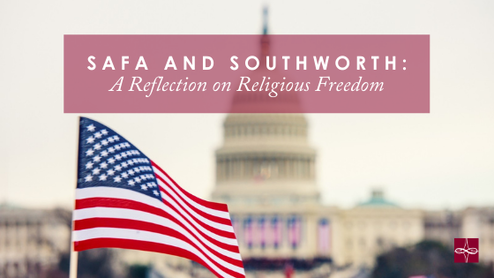
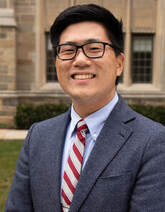
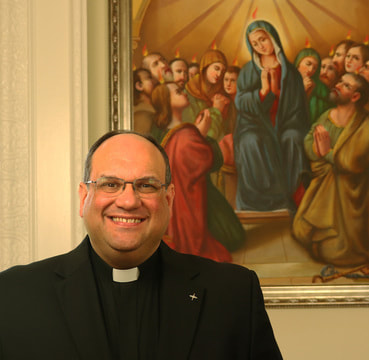
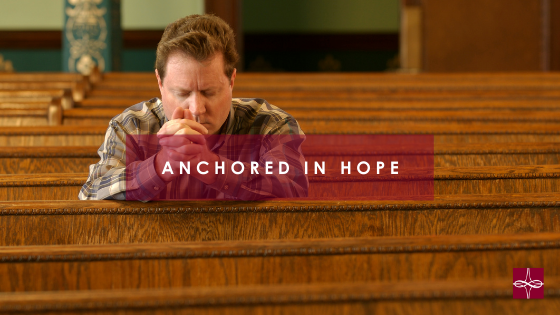
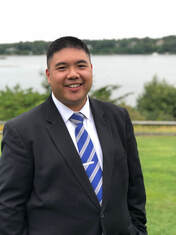

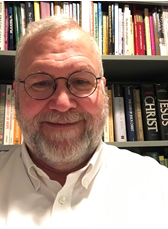


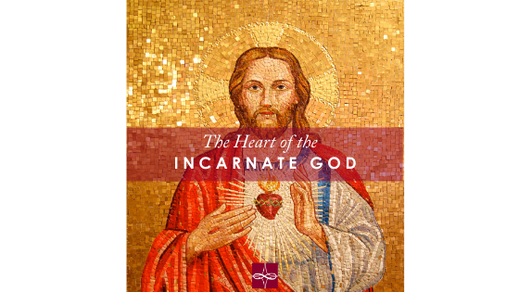
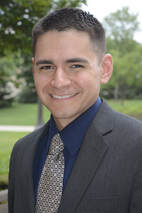
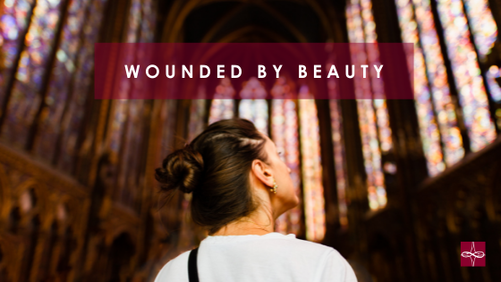

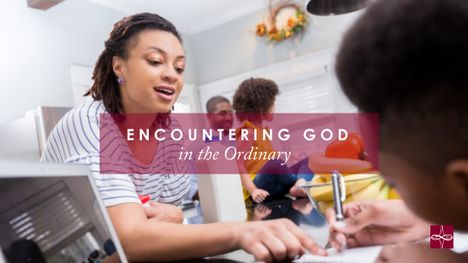

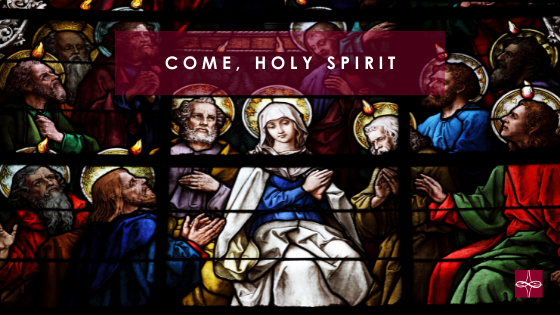

 RSS Feed
RSS Feed